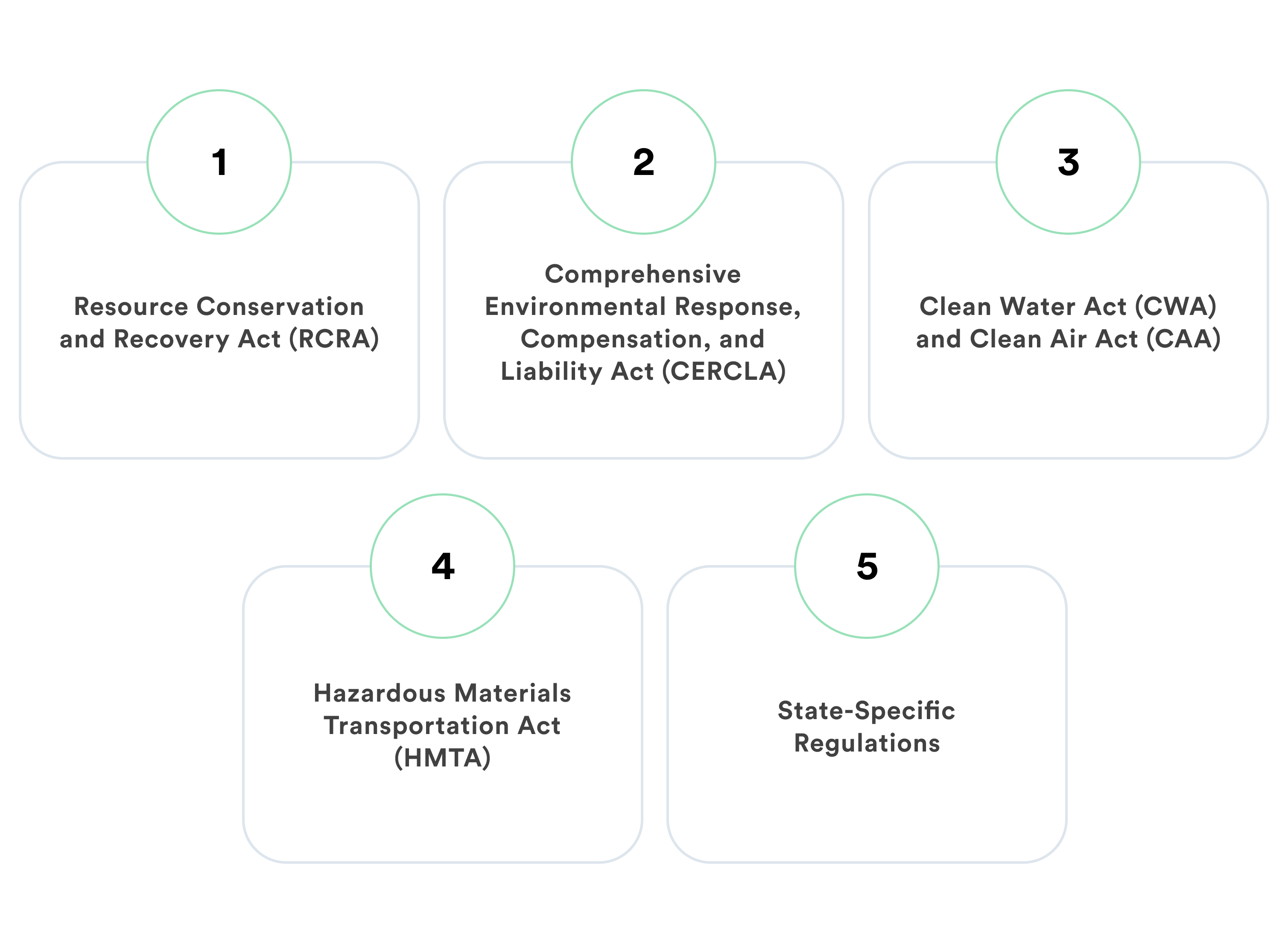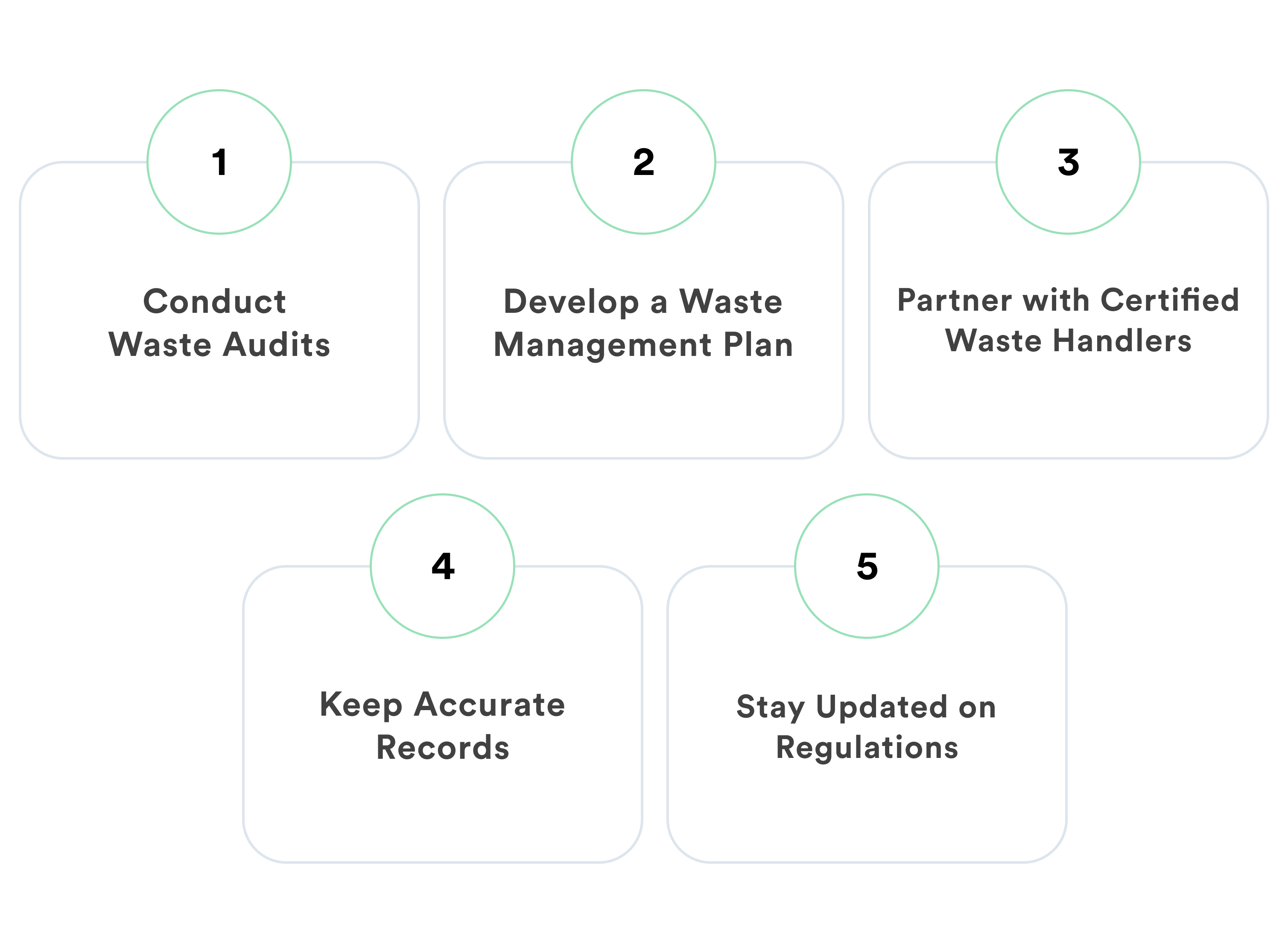Every modern, forward-thinking business needs to prioritize waste compliance to ensure environmental responsibility and avoid legal repercussions. But, as we know better than most, the lack of any comprehensive legislation on waste management means that often businesses are left trying to piece together their legal requirements from a number of different local and national codes, documents and regulations.
This jigsaw-like approach to waste management compliance can be very confusing, which is why we have created this comprehensive guide to what every business needs to know. Drawing on our extensive experience of working in the waste management sphere, this guide delves into the importance of key waste regulations and compliance strategies.
We will take a closer look at the waste types, financial implications of non-compliance and common mistakes made by many businesses. In addition we will examine the role of technology and why maintaining sustainable waste management practices is good for business and not just the environment.
 Why Waste Compliance Matters
Why Waste Compliance Matters
Waste compliance is an essential aspect of business operations, particularly in industries that generate significant waste, such as manufacturing, healthcare, retail, and construction. But adhering to waste regulations is not just about avoiding fines, it is also about embracing environmental responsibility, sustainability, and ensuring long-term business success.
In the United States, the Environmental Protection Agency (EPA) is responsible for enforcing strict regulations to ensure businesses correctly manage and dispose of their waste. Failing to comply with these regulations can lead to substantial penalties, legal action, and reputational damage. For instance, in 2022, Walmart agreed to pay $7.5 million to settle a California lawsuit over the improper disposal of hazardous waste, demonstrating the severe consequences of non-compliance.
Beyond financial penalties, improper waste management can result in environmental contamination, which can lead to lawsuits, community backlash, and additional cleanup costs. Businesses need to prioritize waste compliance not just to avoid legal repercussions but also to strategically position themselves as responsible corporate citizens, which can help to foster consumer trust and long-term profitability. But, perhaps most importantly, because it is the ethically and morally correct thing to do.
Key Waste Compliance Regulations Every Business Should Know
Understanding the regulatory landscape is critical for your business to remain compliant. But it can be confusing. While federal regulations provide a baseline, states and municipalities often have additional rules that companies must follow. Below you can find some of the most important regulations in the U.S. concerning waste management.

1) Resource Conservation and Recovery Act (RCRA)
The RCRA is the primary federal law governing the disposal of solid and hazardous waste. Enforced by the EPA, this regulation ensures that waste is managed safely from its point of generation to final disposal. This is often referred to as ‘cradle-to-grave’ management and it means that businesses must:
- Identify hazardous and non-hazardous waste
- Properly store and label waste
- Transport and dispose of waste using certified handlers
- Maintain accurate records and submit reports
2) Comprehensive Environmental Response, Compensation, and Liability Act (CERCLA)
Also known as the Superfund law, CERCLA holds businesses responsible for cleaning up contaminated sites. If a company improperly disposes of hazardous waste, it could be liable for the cleanup costs, which can run into millions of dollars.
3) Clean Water Act (CWA) and Clean Air Act (CAA)
Both the CWA and CAA are focused on water and air quality, these laws also regulate waste disposal practices to prevent pollution. Businesses that discharge waste into water bodies or release pollutants into the air must obtain permits and follow stringent guidelines to reduce their environmental impact.
4) Hazardous Materials Transportation Act (HMTA)
The HMTA governs the transportation of hazardous materials, including waste. Companies that transport hazardous waste must comply with labeling, packaging, and documentation requirements to ensure safety during transit.
5) State-Specific Regulations
Many states, including California, New York, and Washington, have additional waste compliance laws that go beyond federal regulations. Businesses operating across multiple states must stay informed about regional differences in waste management laws.
How to Comply with Waste Regulations
In order to be fully compliant with waste regulations we recommend that businesses adopt a strategic approach. You can implement the following steps to ensure you meet federal and state requirements:

- Conduct a waste audit
- Identify the types of waste your business generates.
- Determine whether any of it is hazardous or requires special disposal methods.
- Assess current disposal practices to identify gaps.
- Develop a waste management plan
- Outline waste reduction strategies and understand the relevant waste and recycling statistics.
- Establish protocols for proper waste segregation, storage, and disposal.
- Assign responsibilities to employees and train them on compliance procedures.
- Partner with certified waste handlers
- Work with licensed waste disposal companies to ensure proper handling and disposal of hazardous and non-hazardous waste.
- Maintain contracts and documentation to prove compliance.
- Keep accurate records
- Maintain records of waste generation, transport, and disposal.
- Submit required reports to regulatory agencies on time.
- Stay updated on regulations
- Regulations frequently change, so businesses should regularly review updates from the EPA and state environmental agencies.
- Join industry groups or hire compliance consultants to stay informed.
Types of Waste and Their Management
 Hazardous Waste
Hazardous Waste
Hazardous waste is considered anything that can pose a significant risk to either human health or the environment. The EPA classifies hazardous waste based on the following characteristics, with some examples of each provided:
- Ignitability (flammable solvents, oils)
- Corrosivity (acids, batteries)
- Reactivity (explosives, certain chemical wastes)
- Toxicity (heavy metals, pesticides)
Any business generating hazardous waste must follow strict handling, storage, and disposal procedures. This includes storing waste in approved containers, using proper labeling and safety precautions, and disposing of waste through certified hazardous waste disposal services.
 Non-Hazardous Waste
Non-Hazardous Waste
Non-hazardous waste includes materials that do not pose a significant risk to health or the environment. Examples include:
- Paper, cardboard, and office waste
- Food scraps and organic waste
- Plastics and packaging materials
Effective non-hazardous waste management involves producing less waste at the source, implementing effective recycling programs, and composting organic waste. It also includes ensuring proper landfill disposal for non-recyclable items.
The Financial Impact of Non-Compliance: Fines and Legal Consequences
Failure to comply with waste regulations can have severe financial consequences for your business, including:
- Fines and penalties: Businesses can face fines ranging from thousands to millions of dollars, depending on the severity of the violation.
- Legal costs: Companies may need to hire lawyers to defend against lawsuits and regulatory actions.
- Cleanup costs: Businesses responsible for environmental contamination may have to pay for extensive remediation efforts.
- Loss of business opportunities: Non-compliant companies may lose contracts with government agencies and environmentally conscious partners, as well as eroding public trust.
 Common Waste Management Mistakes to Avoid
Common Waste Management Mistakes to Avoid
There are a number of key waste mistakes made by businesses that we often highlight and advise against making. These include:
- Improper waste segregation: Mixing hazardous and non-hazardous waste can lead to compliance violations.
- Lack of training: Uninformed employees may mishandle waste, increasing the risk of violations.
- Failure to keep records: Inadequate documentation can make it difficult to prove compliance during inspections.
- Ignoring state-specific regulations: Businesses operating in multiple states must be aware of regional differences in waste laws.
- Partnering with unlicensed waste handlers: Using uncertified waste disposal companies can result in legal liabilities.
 The Role of Technology in Waste Compliance
The Role of Technology in Waste Compliance
Thankfully, advancements in waste management technology are now making it easier for businesses to manage waste compliance effectively. This includes adopting and utilizing a number of key tech features, including:
- Digital waste tracking systems: Software solutions help you to track waste from generation to disposal, ensuring compliance.
- AI-powered waste sorting: AI-driven systems can improve waste segregation and recycling efficiency.
- Automated compliance monitoring: New platforms can alert businesses to regulatory changes and help maintain accurate records, helping you to stay up to date.
- Smart bin sensor: A smart bin sensor continuously monitors waste levels in real-time, optimizing collection schedules and reducing unnecessary pickups.
Final Thoughts
Waste compliance is not optional but a critical responsibility for businesses across the U.S. Ensuring you remain compliant with regulations not only helps you to avoid legal and financial penalties but it also contributes to wider environmental sustainability.
By conducting waste audits, implementing effective waste management strategies, and leveraging technology, your business can stay ahead of regulatory requirements and demonstrate corporate responsibility. But more than that, proactively managing waste compliance not only safeguards your company’s reputation but also fosters long-term business success in an increasingly eco-conscious world.
Sources
U.S. Environmental Protection Agency (EPA). (n.d.). EPA homepage. Retrieved March 17, 2025, from https://www.epa.gov/
Associated Press. (2024, January). Walmart to pay $500,000 for California hazardous waste settlement. Retrieved March 17, 2025, from https://apnews.com/article/walmart-california-hazardous-waste-settlement-25642537b5b76ff201f53c5862efff58
Amnesty International. (2024, January). United States: Lives devastated and human rights sacrificed by toxic fossil fuel-related pollution from petrochemical plants in Texas and Louisiana. Retrieved March 17, 2025, from https://www.amnesty.org/en/latest/news/2024/01/united-states-lives-devastated-and-human-rights-sacrificed-by-toxic-fossil-fuel-related-pollution-from-petrochemical-plants-in-texas-and-louisiana/
The Guardian. (2023, November 22). EPA investigates PFAS imports to North Carolina from Netherlands. Retrieved March 17, 2025, from https://www.theguardian.com/environment/2023/nov/22/epa-pfas-import-north-carolina-netherlands
ResearchGate. (n.d.). Corporate sustainability management and environmental ethics. Retrieved March 17, 2025, from https://www.researchgate.net/publication/316039810_Corporate_Sustainability_Management_and_Environmental_Ethics
Library of Congress. (n.d.). Federal environmental laws. Retrieved March 17, 2025, from https://guides.loc.gov/environmental-law/federal-laws
Library of Congress. (n.d.). State environmental laws. Retrieved March 17, 2025, from https://guides.loc.gov/environmental-law/state-laws
U.S. Environmental Protection Agency (EPA). (n.d.). Resource Conservation and Recovery Act (RCRA). Retrieved March 17, 2025, from https://www.epa.gov/rcra
U.S. Environmental Protection Agency (EPA). (n.d.). Superfund (CERCLA) overview. Retrieved March 17, 2025, from https://www.epa.gov/superfund/superfund-cercla-overview
National Geographic. (n.d.). Superfund sites and environmental remediation. Retrieved March 17, 2025, from https://education.nationalgeographic.org/resource/superfund/
U.S. Environmental Protection Agency (EPA). (n.d.). ExxonMobil refinery settlement. Retrieved March 17, 2025, from https://www.epa.gov/enforcement/exxonmobil-refinery-settlement
Natural Resources Defense Council (NRDC). (n.d.). Clean Water Act 101. Retrieved March 17, 2025, from https://www.nrdc.org/stories/clean-water-act-101
U.S. Environmental Protection Agency (EPA). (n.d.). Summary of the Clean Air Act. Retrieved March 17, 2025, from https://www.epa.gov/laws-regulations/summary-clean-air-act
Florida Cooperative Extension Service. (n.d.). Economic aspects of waste management. Retrieved March 17, 2025, from https://edis.ifas.ufl.edu/publication/FE767
California Department of Resources Recycling and Recovery (CalRecycle). (n.d.). Laws and regulations. Retrieved March 17, 2025, from https://calrecycle.ca.gov/laws/regulations/

